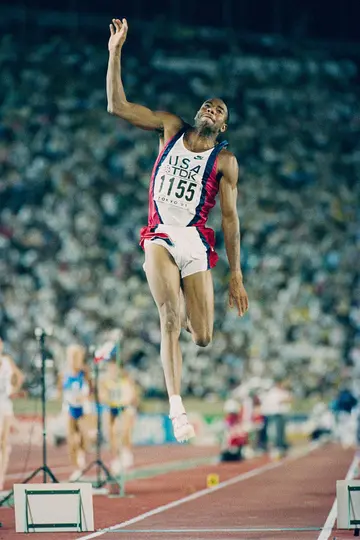Who holds the women's long jump world record? All the details explained
Athletics
The Olympic Games have a long history of producing some of the most incredible moments in the world of sports. From the fastest sprints to the highest jumps, athletes from around the globe gather to compete and showcase their unique talents on the world's biggest stage. One event that has always captivated audiences is the long jump, where athletes attempt to jump the furthest distance possible from a running start. The men's long jump world record will be the focus today.

Over the years, several long jumpers have become famous for their remarkable achievements, setting world records and inspiring future athletes. These universal records have always been the pinnacle of the sport, and their holders have been revered as legends. The suspense of whether an athlete can break a longstanding high stat makes the long jump one of the most exciting events in athletics.
Who holds the women's long jump world record? All the details explained
Athletics
The men's long jump event is one of the most prestigious and exciting disciplines in track and field. It requires a combination of speed, power, and technique to propel oneself as far as possible from a takeoff board into a sandpit. Over the years, numerous athletes have made their mark on this event, but one name stands out: Mike Powell.
On August 30, 1991, at the Universe Championships in Tokyo, Japan, Powell broke Bob Beamon's longstanding universe record in the men's long leap. Beamon had set the previous record of 8.90 meters (29 feet, 2.5 inches) at the 1968 Olympics in Mexico City, and it had remained untouched for over two decades.
First and foremost, it's important to understand just how impressive Beamon's stat was in the first place. It was a monumental achievement at the time, breaking the previous Universe's pinnacle by an incredible 55 centimeters. Beamon's leap was so far beyond what anyone had previously accomplished that it was considered one of the greatest moments in Olympic history.
Which is the fastest F1 car ever? Find out all the details here
Formula 1
For Powell to break this stat more than 20 years later was a feat. But what made his hop even more remarkable was how he did it.
In the lead-up to the 1991 World Championships, Powell had been battling a series of injuries that had limited his training and competition time. He was not considered one of the favorites to win the event, let alone break the Universe's pinnacle.
But Powell had something that most of his competitors did not: a deep understanding of the long leap event and an unshakable belief in his abilities. He had spent countless hours studying the techniques of past champions and honing his skills in the gym and on the track.
Powell's leap was not only technically flawless, but it was also mighty. He exploded off the board with a level of speed and force that few long hopers had ever achieved. He lifted his legs, extending his body as far as possible into the air.
A list of the most popular college sports in the US and Canada
Other Sports

As he reached the peak of his leap, Powell's eyes were fixed on the sandpit ahead of him. He had to time his landing perfectly to ensure he did not lose momentum or distance. And he did just that, landing with his feet together and his body perfectly balanced.
The crowd erupted in cheers as the measurement appeared on the scoreboard: 8.95 meters. Powell had done it. He had broken the universal highest stat and secured his place in history.
The men's long leap universal record progression is a testament to the evolution of the sport of track and field. From humble beginnings in the early 20th century, the record has been broken time and time again by some of the greatest athletes in history. Here is a brief overview of the most significant leaps and the athletes who achieved them.
The first recognized leaping significant stat was set in 1901 by Peter O'Connor of Ireland. His leap of 7.61 meters (24 feet, 11.75 inches) was the first ever to exceed 24 feet. It would be another 19 years before the pinnacle was broken again.
Who are the top 10 richest athletes in Kenya as of 2023?
Athletics
In 1920, American Ted Meredith broke O'Connor's achievement with a spring of 7.76 meters (25 feet, 5.5 inches) at the Olympics in Antwerp, Belgium. This spring stood as the Universe's pinnacle for the next ten years until Jesse Owens took the sport to new heights.
Owens, the legendary American athlete, broke this stat four times in the 1930s. He first broke the 26-foot barrier with a leap of 8.13 meters (26 feet, 8.25 inches) in 1935. The following year, he improved his stat with a spring of 8.19 meters (26 feet, 10.25 inches). Owens then set two more universe stats in 1936, including a leap of 8.13 meters (26 feet, 8.25 inches) at the Berlin Olympics, where he won four gold medals.

In 1960, Ralph Boston of the United States became the first athlete to leap over 27 feet. His leap of 8.21 meters (26 feet, 11.25 inches) broke the previous 8.19 meters set by Owens in 1935. Boston would break his stat two more times in the 1960s.
Top 10 fastest-growing sports in the world right now: Which is the fastest-growing sport?
Other Sports
But Bob Beamon's performance at the 1968 Olympics in Mexico City revolutionized the event. Beamon's jump of 8.90 meters (29 feet, 2.5 inches) shattered the previous record by an astonishing 55 centimeters. His stat stood for over two decades until Mike Powell's historic leap in 1991.
Powell's spring of 8.95 meters (29 feet, 4.5 inches) at the 1991 World Championships in Tokyo remains the current Universe record over 30 years later. Powell's record-breaking leap surpassed Beamon's mark and set a new standard for the sport. Since then, no one has come within six centimeters of Powell's pinnacle.
This progression is a testament to the incredible athletes who have pushed the boundaries of human potential. From O'Connor to Beamon to Powell, each leap represents a moment of athletic excellence and achievement.
Mike Powell of the United States holds the current indoor men's long jump world pinnacle, the same athlete with the outdoor world record. Powell's spring of 8.79 meters (28 feet, 10.25 inches) was achieved in 1992 at the Universe Indoor Championships in Sopot, Poland.
Stephen Curry brilliantly explains what makes the Warriors core special
NBA
Markus Rehm of Germany holds the current men's long leap major for Paralympic athletes. Rehm, a below-the-knee amputee, set the universally highest stat with a hop of 8.48 meters (27 feet, 9.75 inches) at the 2014 IPC Athletics European Championships in Swansea, Great Britain.
Galina Chistyakova of the Soviet Union holds the current women's long jump world record. Chistyakova set the universal record of 7.52 meters (24 feet, 8.25 inches) at a meet in Leningrad (now St. Petersburg), Russia, in 1988.

Jonathan Edwards of Great Britain holds the current men's triple jump world record. Edwards set the Universe's highest stat of 18.29 meters (60 feet, 0.5 inches) at the 1995 World Championships in Gothenburg, Sweden. Edwards' Universe's best jump was a remarkable feat of athleticism and technique, and it cemented his status as one of the greatest triple springers in history.
Top 10 best boxing trainers in the world currently: Find out who tops the list
Boxing

The men's long jump world record, Mike Powell's incredible long jump of 8.95 meters (29 feet, 4.5 inches) at the 1991 World Championships in Tokyo, Japan, remains the men's long jump world record.
READ ALSO: Top 10 footballers with the most free-kick goals in the history of the game
Sports Brief has recently posted about freekicks. Of set pieces in the football game, a free kick just outside the box is a footballing concept that requires dead accurate precision to produce goals. Most free-kick goals are typically very outstanding shots that light up stadiums. Only the very elite can produce such stunning shots.